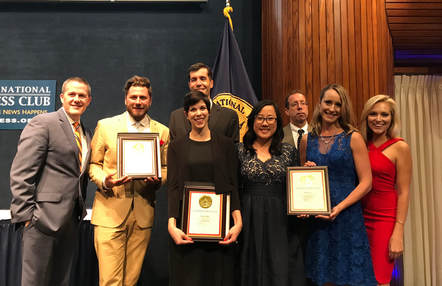2017 National Press Club Ann Cottrell Free Animal Reporting Award Winners
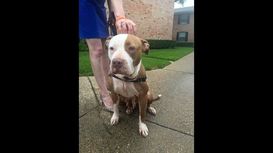
Broadcast:
Winner
Series on Animal Cruelty in Dallas -- KDFW-TV
In a series of reports over the course of a year, KDFW found that the system of investigating and prosecuting animal abuse in Dallas was not working. Their investigation, which featured dozens of unsolved cases of dead animals with signs of horrific abuse, and a dog whose throat was deeply cut, revealed that no one agency was tracking animal cruelty cases from start to finish. Their reporting uncovered that of 4,000 calls reporting animal cruelty to the city in 2015, only 11 cases made it to the District Attorney for prosecution.
After the series ran, the Dallas police announced a partnership with the SPCA of Texas to turn over all its cruelty cases to the non-profit for investigation. A few weeks later the SPCA executed a major raid in south Dallas, which resulted in felony animal cruelty charges.
The reporting at KDFW was thorough, tenacious and resulted in change. This is especially commendable because the station does not have a dedicated investigative unit and all of the reporters, producers, photographers and editors who contributed to the series did so in addition to their daily deadlines.
Winner
Series on Animal Cruelty in Dallas -- KDFW-TV
In a series of reports over the course of a year, KDFW found that the system of investigating and prosecuting animal abuse in Dallas was not working. Their investigation, which featured dozens of unsolved cases of dead animals with signs of horrific abuse, and a dog whose throat was deeply cut, revealed that no one agency was tracking animal cruelty cases from start to finish. Their reporting uncovered that of 4,000 calls reporting animal cruelty to the city in 2015, only 11 cases made it to the District Attorney for prosecution.
After the series ran, the Dallas police announced a partnership with the SPCA of Texas to turn over all its cruelty cases to the non-profit for investigation. A few weeks later the SPCA executed a major raid in south Dallas, which resulted in felony animal cruelty charges.
The reporting at KDFW was thorough, tenacious and resulted in change. This is especially commendable because the station does not have a dedicated investigative unit and all of the reporters, producers, photographers and editors who contributed to the series did so in addition to their daily deadlines.
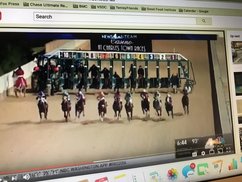
Broadcast:
Honorable Mention Trouble on the Tracks - WRC-TV, The News4 I-Team, Scott MacFarlane, Rick Yarborough, Jeff Piper In an investigation that began in 2013, WRC-TV discovered that more than 160 horses died at the Charles Town race track in West Virginia over a two year span. The series showed a pattern of failures to thoroughly discipline rule-breaking horse trainers, the exhaustion of the local racehorse population and the failure of state racing officials to follow their own safety rules and procedures. Using documents obtained from extensive Freedom of Information requests, hard to get interviews, and difficult to obtain video, the I-team was able to put together a series that exposed shocking danger and death in the horseracing industry. WRC’s reporting resulted in the tightening of safety standards and inspections in the state of West Virginia and efforts introduce stricter federal standards for the racing industry. |
|
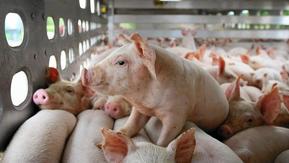
Print/Online:
Winner
The Price of Pork -- David Jackson, Gary Marx, Stacey Wescott, Madison Hopkins, The Chicago Tribune
In a groundbreaking series that looked at large hog confinement facilities across rural Illinois, the Chicago Tribune found horrendous animal cruelty, including cases that had been reported by whistleblowers but ignored by state officials. The reporting team at the Tribune was able to put 19 Illinois hog confinement workers on record to describe the mistreatment of pigs they witnessed, and in one case, inflicted. When the reporters asked them to describe everyday life inside the facilities, the employees volunteered accounts of pigs being gouged, kicked and sometimes pummeled so badly that they had to be euthanized. A months-long FOIA battle for records revealed that hog waste spills accounted for nearly half of the one million fish killed in Illinois water pollution incidents, with no other industry coming close to causing that much damage. The reporting team created a searchable online map of 70 hog waste pollution events and assembled and analyzed all known undercover videos of US hog confinements since 1998, 20 in total. They also created visual galleries of sows who are confined to gestation crates, where they can’t even turn around for much of their lives.
One of the reporters on the team serves as a professor Northwestern University’s Medill journalism school and brought more than 40 students into the project as research assistants. As a result of the stories, state lawmakers are proposing several bills and Illinois Senator Dick Durbin said of the series, “I hope it will lead to swift reforms to protect animals in confinement facilities.”
Winner
The Price of Pork -- David Jackson, Gary Marx, Stacey Wescott, Madison Hopkins, The Chicago Tribune
In a groundbreaking series that looked at large hog confinement facilities across rural Illinois, the Chicago Tribune found horrendous animal cruelty, including cases that had been reported by whistleblowers but ignored by state officials. The reporting team at the Tribune was able to put 19 Illinois hog confinement workers on record to describe the mistreatment of pigs they witnessed, and in one case, inflicted. When the reporters asked them to describe everyday life inside the facilities, the employees volunteered accounts of pigs being gouged, kicked and sometimes pummeled so badly that they had to be euthanized. A months-long FOIA battle for records revealed that hog waste spills accounted for nearly half of the one million fish killed in Illinois water pollution incidents, with no other industry coming close to causing that much damage. The reporting team created a searchable online map of 70 hog waste pollution events and assembled and analyzed all known undercover videos of US hog confinements since 1998, 20 in total. They also created visual galleries of sows who are confined to gestation crates, where they can’t even turn around for much of their lives.
One of the reporters on the team serves as a professor Northwestern University’s Medill journalism school and brought more than 40 students into the project as research assistants. As a result of the stories, state lawmakers are proposing several bills and Illinois Senator Dick Durbin said of the series, “I hope it will lead to swift reforms to protect animals in confinement facilities.”
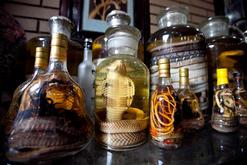
Print/Online:
Honorable Mention
A Deeper Look at Wildlife Tourism - Rachael Bale, National Geographic
By taking a hard look at common wildlife tourism practices such as swimming with dolphins, riding elephants and photo opportunities with lions and tigers, Rachael Bale’s reporting illustrated why these kinds of attractions are detrimental to the physical and psychological welfare of the animals involved.
Most notably, her reporting put a spotlight on the world’s largest online tourism company, TripAdvisor, and its promotion of these inhumane attractions. Her reporting lifted the veil on the cruelty involved, for example, revealing how baby elephants are put through a savage and lengthy “crush” process where trainers stab their legs with sticks with nails on the end to force them to raise their feet on command and any mistakes are punished with beatings.
When Bale reached out to TripAdvisor for comment, they defended their promotion of these attractions, but five months after the National Geographic story ran, TripAdvisor announced they they would no longer promote these animal wildlife attractions, and would develop a portal to educate its users on the animal welfare and conservation implications of different types of attractions. In related reporting, Bale also created an explainer-style guide to shopping responsibly while on vacation, by avoiding seashell jewelry, bird feathers and snake wine.
Honorable Mention
A Deeper Look at Wildlife Tourism - Rachael Bale, National Geographic
By taking a hard look at common wildlife tourism practices such as swimming with dolphins, riding elephants and photo opportunities with lions and tigers, Rachael Bale’s reporting illustrated why these kinds of attractions are detrimental to the physical and psychological welfare of the animals involved.
Most notably, her reporting put a spotlight on the world’s largest online tourism company, TripAdvisor, and its promotion of these inhumane attractions. Her reporting lifted the veil on the cruelty involved, for example, revealing how baby elephants are put through a savage and lengthy “crush” process where trainers stab their legs with sticks with nails on the end to force them to raise their feet on command and any mistakes are punished with beatings.
When Bale reached out to TripAdvisor for comment, they defended their promotion of these attractions, but five months after the National Geographic story ran, TripAdvisor announced they they would no longer promote these animal wildlife attractions, and would develop a portal to educate its users on the animal welfare and conservation implications of different types of attractions. In related reporting, Bale also created an explainer-style guide to shopping responsibly while on vacation, by avoiding seashell jewelry, bird feathers and snake wine.
